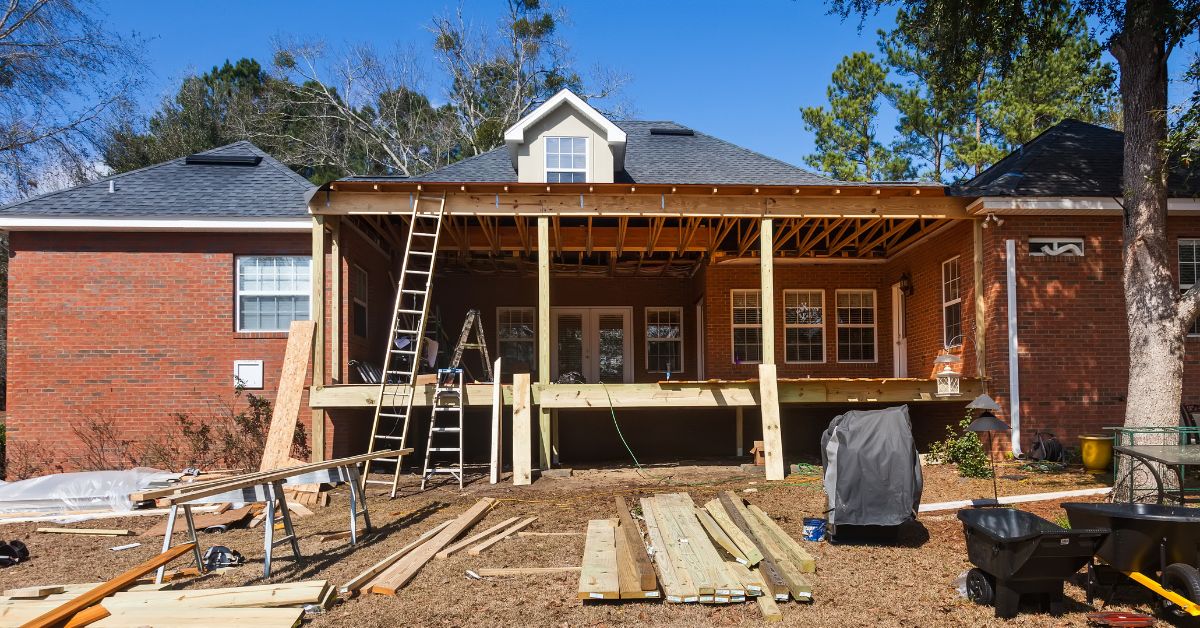As a real estate investor or property owner in the dynamic Atlanta market, you're likely aware of the challenges and opportunities that come with managing a rental property. Whether you're new to the game or a seasoned landlord, the goal remains the same: maximize your investment while providing quality living spaces for your tenants.
In this post, we delve into proven strategies and insights that can help elevate your rental property's appeal and efficiency. From understanding the local market dynamics to implementing cost-effective upgrades, we cover a range of topics designed to boost both tenant satisfaction and your return on investment (ROI). We'll explore the importance of making thoughtful property improvements, employing effective management techniques, and focusing on tenant retention to ensure a steady income stream. Additionally, we address competitive rental pricing, regular property maintenance, strategic marketing, and the significance of legal compliance and financial management.
Join us as we navigate the nuances of the Atlanta rental market and provide you with actionable tips to enhance your property's performance. Whether you manage your property independently or through a professional property management company, these insights are tailored to help you achieve long-term success in your real estate endeavors.
Understanding the Market
To excel in the Atlanta rental market, a nuanced understanding of both the broader market dynamics and the specific preferences of local renters is indispensable. This doesn't just involve setting the right rental rates; it's about comprehensively tailoring your approach to meet the market's unique demands.

Analyzing Market Trends
The Atlanta rental market is characterized by its evolving nature, influenced by various economic, social, and geographic factors. Key elements include:
- Economic Trends: Track economic indicators like job growth, income levels, and the influx of new businesses. A thriving job market, for instance, might increase demand for rentals in specific areas.
- Housing Supply: Stay updated on new housing developments and changes in housing policies. An increase in housing supply, for example, could lead to more competition and potentially affect rental pricing.
- Demographic Changes: Understanding who is moving into the area (e.g., young professionals, families) can help you anticipate the kind of properties that will be in demand.
Understanding Renter Preferences
Renters in Atlanta have diverse needs and preferences, which can vary significantly based on factors like age, family size, and lifestyle:
- Young Professionals: Might prioritize locations with easy access to nightlife, public transportation, and high-speed internet.
- Families: Generally look for properties in neighborhoods with good schools, parks, and family-friendly amenities.
- Elderly Tenants: May prefer quieter locations with easy access to healthcare facilities and community centers.
Setting Appropriate Rental Rates
- Market Comparison: Regularly compare your property with similar ones in the area (size, condition, amenities) to gauge a competitive rental rate.
- Tenant Feedback: Listen to feedback from current and prospective tenants about what they consider a fair price.
- Adaptability: Be ready to adjust your rates in response to market changes, ensuring they are neither too high (risking vacancies) nor too low (reducing profitability).
This approach ensures you are not merely reacting to the market but strategically positioning your property to meet its current and emerging needs. By deeply understanding and adapting to these market dynamics, you can more effectively manage your Atlanta rental property for optimal performance.
Making Property Improvements
Enhancing your rental property in Atlanta is not just about repairs and maintenance; it's about strategically upgrading and modernizing to increase its market appeal and value. Thoughtful improvements can make your property stand out in a competitive market, attract quality tenants, and even justify higher rental rates.

Interior Upgrades
- Smart Technology: Integrating smart home technology is a trend that's catching on fast. Consider installing smart thermostats, security systems, and lighting controls. These features not only appeal to tech-savvy tenants but also add to the energy efficiency of your property.
- Modern Flooring: Replacing old carpets with hardwood or laminate flooring can significantly uplift the interior's look. These options are not only aesthetically pleasing but also easier to clean and maintain, making them attractive to tenants.
- Kitchen and Bathroom Renovations: These areas often offer the best return on investment. Upgrading appliances to energy-efficient models, installing modern countertops, and refreshing cabinets can dramatically improve the appeal of these spaces.
- Fresh Paint: A new coat of paint in neutral, contemporary colors can rejuvenate the entire space. It's a cost-effective way to give your property a fresh, clean look.
Exterior Upgrades
- Curb Appeal: First impressions matter. Enhance the exterior with landscaped gardens, well-maintained lawns, and clean, inviting entrances. Even small touches like new mailbox, house numbers, or a freshly painted front door can make a significant difference.
- Outdoor Living Spaces: Consider adding or improving outdoor spaces such as patios, decks, or balconies. These are especially attractive features for tenants who value outdoor relaxation and entertainment areas.
These improvements are not just about aesthetics; they are investments in the property that can lead to higher rental income, reduced vacancy periods, and increased property value over time. By focusing on both the interior and exterior upgrades that resonate with Atlanta's diverse tenant base, you can ensure your property remains competitive and desirable in the market.
Effective Property Management
Effective property management is a critical component in maximizing the performance of your Atlanta rental property. While some property owners choose to manage their properties independently, the complexities and demands of modern property management often call for professional expertise.
.jpg)
Streamline property operations
Why Consider a Professional Property Management Company?
- Expertise in Market Analysis: Professional property managers are well-versed in analyzing market trends and setting competitive rental rates. They possess a deep understanding of the local real estate market, which is crucial in positioning your property effectively to attract and retain tenants.
- Efficient Tenant Screening: A rigorous tenant screening process is key to finding reliable and responsible tenants. Property management companies have established systems for background checks, credit reports, and reference verifications, reducing the risk of tenant-related issues and ensuring a steady rental income.
- Ongoing Maintenance and Repairs: Timely maintenance and repairs are essential in keeping tenants satisfied and preserving the value of your property. Property managers have networks of trusted contractors and service providers, ensuring that maintenance issues are addressed promptly and professionally.
- Legal Compliance and Documentation: Navigating the legal aspects of property rentals can be daunting. A property management company stays abreast of relevant laws and regulations, ensuring that your property remains compliant. This includes understanding tenant-landlord laws, lease agreements, and handling legal disputes, if necessary.
- Improved Tenant Relations: Good property managers act as intermediaries between you and your tenants, handling day-to-day interactions, queries, and complaints. This professional approach can lead to better tenant relations, higher tenant retention rates, and ultimately, a more profitable investment.
- Financial Management and Reporting: Keeping track of financial aspects such as rental collections, operating expenses, and financial reporting can be efficiently managed by a property management company. They provide regular financial reports, making it easier for you to monitor the financial health of your investment.
The Bottom Line
Hiring a professional property management company can be a strategic decision that pays off in the long run. It frees you from the daily operational hassles, ensures professional handling of your property, and can lead to improved financial performance and tenant satisfaction. If you're seeking to optimize the performance of your rental property in Atlanta, considering a professional property management service might be a step worth taking.
Focus on Tenant Retention
Tenant retention is a crucial aspect of property management that significantly impacts the consistent flow of rental income. It's often more cost-effective to retain a good tenant than to find a new one. Here are key strategies to improve tenant retention in your Atlanta rental property:

Building Positive Relationships
- Effective Communication: Establish open lines of communication. Keep tenants informed about any property-related news, maintenance schedules, and any changes that may affect them. Listening to their concerns and feedback also plays a pivotal role in building a trusting relationship.
- Respect and Responsiveness: Treat tenants with respect and address their concerns promptly. Whether it's a repair request or a query about their lease, timely and effective responses can significantly enhance tenant satisfaction.
Respecting Tenant Privacy
- Privacy Policies: While it’s important to conduct regular property inspections, it’s equally crucial to respect the privacy of your tenants. Always provide adequate notice before entering the property, and ensure that these visits are at reasonable times and for legitimate reasons.
Simplifying Rent Payments
- Convenient Payment Options: In the digital age, offering online rent payment options can be a huge convenience for tenants. It simplifies the payment process and can lead to timely rent submissions. Including options for automatic payments can further enhance this convenience.
Proactive Problem-Solving
- Maintenance and Repairs: Be proactive in maintaining the property. Regularly check in with tenants to identify any maintenance needs. Addressing repairs promptly not only keeps the property in good condition but also shows tenants that you value their comfort and safety.
- Personalized Touch: Small gestures like sending holiday cards, offering flexible lease renewal terms, or even acknowledging significant personal events can go a long way in building a positive landlord-tenant relationship.
The Impact of Tenant Retention
Focusing on tenant retention has a direct impact on the stability of your rental income. Satisfied tenants are more likely to renew their leases, leading to lower vacancy rates and reduced turnover costs. Furthermore, happy tenants can become advocates for your property, potentially attracting more quality renters through word-of-mouth recommendations.
Competitive Rental Pricing
Setting the right rental price is a critical factor in the success of your Atlanta rental property. Competitive rental pricing ensures that your property remains attractive to potential tenants while also maximizing your income potential.

The Risks of Mispricing
- Overpricing Risks: Setting the rent too high may lead to longer vacancy periods. Prospective tenants are likely to compare your property with others in the area, and an overpriced property could be overlooked. Extended vacancies can significantly impact your annual revenue. In addition, if a property is priced too high, it might attract only desperate tenants who can’t get approved to rent anything in their price range, leading to later problems.
- Underpricing Drawbacks: Conversely, pricing your property too low might result in a quick rental but can reduce your overall profitability. It might also attract tenants who are not the best fit for your property.
Finding the Right Balance
- Market Research: Conduct thorough market research to understand the going rates for similar properties in your area. This includes considering factors like location, property size, amenities, and current market conditions.
- Regular Reviews: Rental markets can fluctuate, so it's important to review and adjust your pricing regularly. This might mean increasing rent in line with market changes or offering incentives during slower rental periods.
- Professional Appraisal: Consider consulting with real estate professionals or property managers who have in-depth knowledge of the Atlanta rental market. They can provide valuable insights and help you set a competitive price that reflects the true value of your property.
Responsive Pricing Strategies
- Adaptability: Be prepared to adjust your rental price based on feedback and occupancy rates. If your property is not renting as quickly as expected, it may be necessary to reevaluate your pricing strategy.
- Tenant Value: Remember that a good tenant who pays rent reliably and takes care of your property is valuable. Sometimes, a slightly lower rent for a high-quality tenant can be more profitable in the long run compared to higher rent with frequent turnover.
Setting competitive rental pricing is more art than science, requiring a balance between market rates and the unique attributes of your property. By staying informed and adaptable, you can ensure that your rental price attracts the right tenants and maintains a steady income flow, contributing to the long-term success of your rental investment.
Regular Property Inspection and Maintenance
Regular inspections and timely maintenance are pivotal for the upkeep of your Atlanta rental property. This proactive approach not only prevents minor issues from escalating into major repairs but also signals to your tenants that their comfort and safety are top priorities.

Importance of Regular Inspections
- Identifying Issues Early: Regular inspections help in identifying maintenance needs before they become costly repairs. This includes checking for leaks, examining electrical systems, and ensuring that all appliances are in good working order.
- Safety Checks: Inspections are also crucial for ensuring the property meets safety standards. This involves checking smoke detectors, carbon monoxide detectors, and ensuring that the property is structurally sound.
Prompt Maintenance Responses
- Tenant Satisfaction: Promptly addressing maintenance requests can significantly impact tenant satisfaction and retention. It demonstrates your commitment to maintaining a safe and comfortable living environment.
- Cost Efficiency: Dealing with maintenance issues as they arise can be more cost-effective than handling larger problems that develop from neglect. Regular maintenance can extend the life of appliances and systems within your property, saving money in the long run.
Developing a Maintenance Schedule
- Routine Checks: Establish a schedule for routine maintenance tasks, such as HVAC inspections, gutter cleaning, and pest control. This not only ensures the functionality and longevity of these systems but also helps in avoiding emergencies.
- Seasonal Maintenance: Tailor your maintenance activities based on the seasons. For example, preparing the property for winter might include checking the heating system and insulating pipes.
Communication with Tenants
- Maintenance Requests: Make it easy for tenants to report maintenance issues. Whether it’s through an online portal or a dedicated phone line, clear communication channels for maintenance requests can enhance the tenant-landlord relationship.
- Feedback and Follow-up: After completing maintenance work, seek feedback from tenants to ensure they are satisfied with the work done. This helps in building trust and a sense of community.
By investing in the regular upkeep of your property, you are also investing in its long-term success and profitability.
Strategic Marketing and Tenant Selection
A key aspect of managing your Atlanta rental property effectively is the combination of strategic marketing and thorough tenant screening. This dual approach ensures not only that your property reaches potential renters but also that those who occupy it are reliable and responsible.

Effective Marketing Strategies
- Professional Marketing Materials: High-quality photographs, detailed descriptions, and virtual tours can significantly enhance the appeal of your property. Ensure that your marketing materials professionally showcase the best features of your rental.
- Targeting the Right Demographics: Understand the type of tenants most likely to be interested in your property. For example, properties near universities might appeal to students, while those in family-oriented neighborhoods might attract families.
- Utilizing Online Platforms: Leverage popular rental websites and social media platforms to reach a wider audience. Ensure your listings are on relevant platforms where potential tenants are most likely to search for rentals.
- Offline Marketing: Don't overlook traditional marketing methods like signage, local newspaper listings, and community bulletin boards, especially if they are popular in your area.
Thorough Tenant Screening
- Background Checks: Conduct comprehensive background checks that include credit history, criminal record, and past evictions. This helps in assessing the financial stability and reliability of potential tenants.
- Employment and Income Verification: Confirming the employment status and income of applicants is crucial. This ensures they have the means to afford the rent and are likely to be financially responsible.
- Reference Checks: Contacting previous landlords and personal references can provide insights into the tenant's behavior and reliability.
- Fair Housing Laws Compliance: Ensure that your tenant screening process complies with fair housing laws to avoid discrimination. This involves having a consistent screening process for all applicants.
Effective marketing and tenant screening are not just processes but integral parts of a successful rental strategy. By investing effort into these areas, you can greatly increase the chances of finding tenants who will care for your property and maintain a steady rental income.
In conclusion, managing a rental property in Atlanta requires a multifaceted approach, blending market understanding, property improvements, effective management, tenant retention strategies, competitive pricing, diligent maintenance, and strategic marketing and tenant selection.
Understanding the local rental market is foundational, enabling you to set competitive rental rates and tailor your property to meet tenant preferences. Making timely property improvements, both inside and out, not only enhances the appeal of your rental but also boosts its value. Engaging a professional property management company can streamline operations, ensuring your property is well-maintained and legally compliant, while also fostering positive relationships with tenants.


